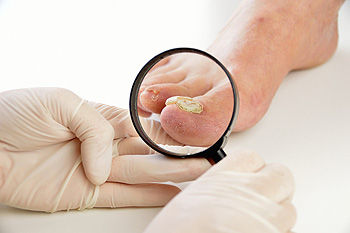
Dr. Kenneth Rosenthal
Dr. Jonathan C. O’Quinn
Dr. Michael J. Price

Dr. Kenneth Rosenthal
Dr. Jonathan C. O’Quinn
Dr. Michael J. Price
 Signs that you may have contracted a fungal toenail infection are rather easy to spot. Typically, you will notice a whitening or yellowing of the nail, and it will appear to be thicker and more brittle. The fungus, known as onychomycosis, is often spread in swimming pools, saunas, gyms, or nail salons – places where you are likely to walk barefoot. Tight socks that hold in moisture may also be a contributing factor. Heat, humidity, and perspiration help spread the infection, which is highly contagious. A few natural remedies that may help reduce the fungus from spreading include applying tea tree, lavender, lemon, or thyme oils to the affected nails. A foot bath with baking soda or white vinegar may help too. However, if the nail condition persists or spreads it is suggested that you consult with a podiatrist for an examination and treatment plan.
Signs that you may have contracted a fungal toenail infection are rather easy to spot. Typically, you will notice a whitening or yellowing of the nail, and it will appear to be thicker and more brittle. The fungus, known as onychomycosis, is often spread in swimming pools, saunas, gyms, or nail salons – places where you are likely to walk barefoot. Tight socks that hold in moisture may also be a contributing factor. Heat, humidity, and perspiration help spread the infection, which is highly contagious. A few natural remedies that may help reduce the fungus from spreading include applying tea tree, lavender, lemon, or thyme oils to the affected nails. A foot bath with baking soda or white vinegar may help too. However, if the nail condition persists or spreads it is suggested that you consult with a podiatrist for an examination and treatment plan.
If left untreated, toenail fungus may spread to other toenails, skin, or even fingernails. If you suspect you have toenail fungus it is important to seek treatment right away. For more information about treatment, contact one of our podiatrists of Eastern Carolina Foot & Ankle Specialists. Our doctors can provide the care you need to keep you pain-free and on your feet.
Symptoms
Treatment
If self-care strategies and over-the-counter medications does not help your fungus, your podiatrist may give you a prescription drug instead. Even if you find relief from your toenail fungus symptoms, you may experience a repeat infection in the future.
Prevention
In order to prevent getting toenail fungus in the future, you should always make sure to wash your feet with soap and water. After washing, it is important to dry your feet thoroughly especially in between the toes. When trimming your toenails, be sure to trim straight across instead of in a rounded shape. It is crucial not to cover up discolored nails with nail polish because that will prevent your nail from being able to “breathe”.
In some cases, surgical procedure may be needed to remove the toenail fungus. Consult with your podiatrist about the best treatment options for your case of toenail fungus.
If you have any questions, please feel free to contact our office located in Greenville, NC . We offer the newest diagnostic and treatment technologies for all your foot care needs.